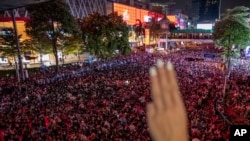Thousands of demonstrators have defied a state of emergency the Thai prime minister declared in response to massive protests demanding his resignation and reform of the country’s constitutional monarchy.
Prime Minister Prayuth Chan-ocha signed the decree late Wednesday night after tens of thousands of protesters marched on his office at Government House in Bangkok hours earlier, vowing not to leave until he agreed to step down. Shortly after the emergency was declared, police dispersed the crowd and arrested more than 20 people who refused to leave, including protest leaders Arnon Nampha and Parit “Penguin” Chiwarak.
In an extraordinary display of rebellion Wednesday, protesters were pushed back by police as they shouted at a motorcade carrying King Maha Vajiralongkorn and Queen Suthida as it drove past the crowd and held up a three-fingered salute, a symbol of defiance borrowed from the popular U.S. Hunger Games books and film trilogy.
Despite warnings not to proceed with a planned demonstration in Bangkok on Thursday, as many as 1,000 demonstrators gathered in the city’s shopping district. The crowd blocked a major intersection, where one of the leaders had been arrested, chanting slogans calling for the prime minister’s resignation.
“Like dogs cornered, we are fighting ‘til our deaths,” protest leader Panupong “Mike Rayong” Jadnok told a cheering crowd. “We won’t go anywhere.”
The prime minister’s decree prohibits political gatherings of five or more people and the dissemination of news and online information that the government believes could threaten national security.
“The measures were necessary to ensure peace and order and to prevent further incidents after protesters affected the royal motorcade and violated the monarchy with provocative language, government spokesman Anucha Burapachaisri said in a statement.
Prayuth is a former army general who seized power in a 2014 coup that ousted the elected civilian government. He won election to the post last year, but protesters say the vote was rigged in his favor due to constitutional laws drafted by the military.
In addition to demanding reform of the country’s constitution, the demonstrators are seeking to reduce the influence of the Thai monarchy. The institution maintains divine-like status among Thailand’s elite, and is protected by strict “lese majeste” laws, which impose prison sentences on anyone convicted of insulting the monarchy.





